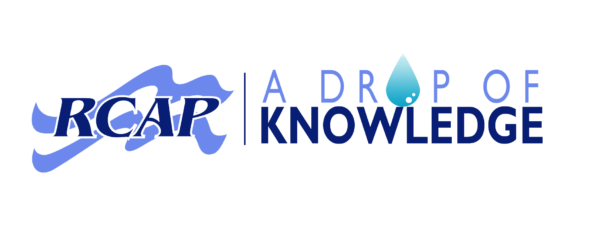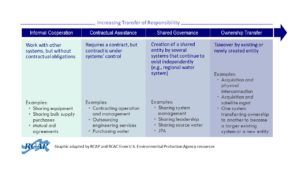November Drop of Knowledge

Partnering by Example
As we all know, COVID-19 has put us in some tough spots throughout the course of 2020. However, it is during these trying times that some outside of the box thinking can lead to some real, tangible gains. Prior to COVID-19, the U.S. Environmental Protection Agency (EPA) and CADMUS Group had been hard at work developing a new set of training materials to help educate water stakeholders on the value of partnerships. RCAP joined the mix shortly after the draft materials were finished and was able to leverage its national training network and philanthropic support to pilot the material.
RCAP Inc., RCAP Solutions (RSOL), Southeastern Rural Community Assistance Project (SERCAP), and the Great Lake Community Action Partnership (GLCAP) all agreed to play a role in delivering this new training. The first pivot in delivery came just months before several of the regions were set to facilitate the in-person trainings—COVID-19 had brought a halt to all in-person gatherings. This meant that the group had to either cancel the trainings or come up with a viable alternative to in-person delivery. Virtualization of the training was the clear and obvious choice. Taking the materials online was not the only unique change. All the regional partners agreed to partake in the delivery of each other’s virtual trainings, to assist with widespread facilitation.
However, the materials were not necessarily designed for an online format—a huge part of the training toolkit was dependent on open discussion and activities revolving around several worksheets. These training modules were also designed specifically for water systems so in order to be inclusive of both water and wastewater, the RCAP team modified the materials to include both topics since collaboration and partnerships can be a huge benefit to either system type. There was also a full day’s worth of material that needed to be covered without overwhelming the audience. The training was converted to an online format and the materials were broken into two 2-hour sessions, spread out across two days.
Day 1
Module 1: Capacity Development
- Provides foundational knowledge to help systems understand the benefits of forming partnerships to increase technical, managerial, and financial capacity (TMF). TMF capacity allows systems to have the capability to consistently provide safe drinking water to the public while meeting regulatory compliance. It is important to always remember that TMF capacity is like a three-legged stool. The stool cannot support any weight without all three legs.
Module 2: Partnerships Overview
- Defines the four types of partnerships that are consistently referenced throughout all of the modules (Figure 1).
- Informal Cooperation: Systems collaborating without a contract in place.
- Contractual Assistance: Systems contracting with one another or outside service providers.
- Shared Governance: Systems create a new management entity designed to serve the independent systems that formed it.
- Ownership Transfer: Systems engage in mergers, mutual transfers of existing entities, or the creation of new entities.

Figure 1: Four Types of Partnerships
Module 3: Current Partnerships Activity Exercise
- Helps systems identify partnership activities that they are already engaging in. Self-reflection followed by a discussion session that gives the systems an opportunity to hear what other systems are already doing.
- Facilitated via breakout rooms. Breakout rooms are the online version of small group discussions. This setting gave communities ample time to discuss their partnership activities with others in their small group. The activity was closed out by bringing all the groups back together and sharing key findings with the entire audience.
Day 2
Module 4: Identifying Challenges
- Allows systems an opportunity to identify their challenges and strengths. Systems were encouraged to self-reflect and identify areas of capacity they were struggling to meet. Then, the group was able to discuss how partnerships might be used to help overcome those challenges or improve upon any pre-existing strengths.
- Facilitated through both breakout rooms and an entire group discussion setting.
Module 5: Identifying and Assessing Partnership Opportunities
- Discusses how systems can identify and engage in potential partnerships. It also covers the basics of how to assess whether a potential partnership is a practical tool to overcome any identified challenges. The module also goes into greater detail about the positives and the negatives of the four partnership types that were previously identified.
Module 6: Expanding Partnership Activities Exercise
- An exercise where systems identified ways to expand upon their partnership activities.
- Expanding an existing partnership with a new partner.
- Expanding an existing partnership with a new activity.
- Facilitated via breakout rooms and in an entire group discussion setting.
Module 7: Implementing Possible Partnership Solutions
- Explains the implementation process of previously identified partnership solutions.
- Communication strategies with stakeholders
- Funding options
- Importance of community champions
- Third party facilitation
Module 8: Action Plan Exercise
- An exercise that helps attendees put together an action plan to implement possible partnership solutions.
- Can be delivered in a one-on-one setting outside of the training, upon request by the community.
Case Studies:
- Informal Cooperation –Birmingham Water Works offered their internal training program to other public water systems in the area (Birmingham, Alabama)
- Contractual Assistance – Beckham County Rural Water contracted with a for-profit company to manage and operate aspects of their system (Beckham County, Oklahoma)
- Shared Governance/Joint Powers Agency – Lower Rio Grande Public Water Works Authority pushed for the passage of legislation that allowed them to create a new joint water association (Lower Rio, New Mexico)
- Ownership Transfer – Vinton County sold its water system to Jackson County
Over a 3-month period, the training was delivered to attendees in the following states:
- Illinois: 36 attendees
- Pennsylvania: 33 attendees
- Massachusetts: 35 attendees
- Florida: 37 attendees
- Total: 141 attendees
Attendees included public water/wastewater system staff, elected officials, contractors, consultants, local development districts, federal and state agency staff, and technical assistance providers. Overall, the training was well-received, as 94% of the survey respondents indicated that they would recommend this workshop to their peers. A common theme among the survey respondents was that they all found the mix of activity-based discussion modules with informational PowerPoint-driven modules to be the most impactful part of the workshop. Further, the approach of having three different technical assistance providers from three different regions of the country presenting the material added value for the participants. As the training’s success is evidenced by this respondent’s feedback, “one of the most valuable assets during the training was having folks available that were knowledgeable of the different topics discussed.”
EPA, CADMUS, RCAP Inc., RSOL, SERCAP, and GLCAP were able to all come together to partner on the delivery of this training, leading communities on the topic of partnerships by way of example. Undoubtedly, some of the best elements of this entire process happened as a direct result of the impact of COVID-19. The feedback gathered during this entire process will be used by all the partners to continue to allow us to better support our rural communities all across the nation. This Partnerships Training Toolkit will be released nationally to the public in 2021.
